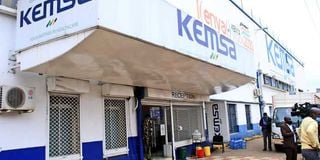Kemsa scandal: Eight firms probed for tax evasion

The Kenya Medical Supplies Authority's offices in Industrial Area, Nairobi, as pictured on September 9, 2020.
What you need to know:
- The eight companies are Kilig, which Jubilee vice-chairman David Murathe denied having any relations with when he was grilled by EACC last September.
- One of the companies has not updated the PIN on KRA iTax system and this is inactive,” reads the report.
Details of eight companies that imported Covid-19 materials at the height of the pandemic cannot be traced by the Kenya Revenue Authority (KRA), as they did not provide their PINs to the taxman, raising fears that they might have evaded paying billions in taxes.
A preliminary report by KRA seen by the Sunday Nation shows that out of the eight companies, six did not at all provide their PINs, one provided one that has not been migrated to iTax and is therefore inactive, while one provided a PIN that does not match the given name.
The eight companies are Kilig, which Jubilee vice-chairman David Murathe denied having any relations with when he was grilled by Ethics and Anti-Corruption Commission (EACC) last September.
Kilig, registered on January 22 was not among the pre-qualified firms at the Kenya Medical Supplies Authority. It was hand-picked and awarded Sh4 billion tender for the supply of 450,000 personal protective equipment at Sh9,000 each.
Seven taxpayers
Other companies are Accenture Kenya Ltd, Medisystem Supply and Services Ltd, Jackson Mwangi Kirima trading as Haksson Medpharm Supplies, Abbott GmbH, AGI, Roche Diagnostics (pty) Ltd, and Tronz Saving Lives.
The KRA report sent to the National Assembly Public Investments Committee, which is currently examining the special audit report on Covid-19 by Auditor-General, indicates that Accenture Kenya Ltd supplied goods worth Sh225 million. Others are Haksson Medpharm Supplies, Roche Diagnostics (pty) Ltd, AGI and Medisystem.
“From the data provided, there was insufficient information in respect to seven of the companies to enable KRA identify them in its systems using PINs which are the unique identifier for taxation purposes. One of the companies has not updated the PIN on KRA iTax system and this is inactive,” reads the report. “KRA has requested additional information in respect to the seven taxpayers and is also following up with the registrar of companies to try and identify them.”
The House committee chaired by Abdulswamad Nassir, in a letter to KRA dated November 4, sought information from the taxman on whether the companies that supplied PPEs to Kemsa made declarations of the imports they made and paid the requisite taxes.
VAT obligation
KRA indicates that in their preliminary analysis of the VAT for the 94 companies whose PINs were indetifiable, 69 did not declare any supplies to Kemsa.
Out of the 69, 10 do not have a VAT obligation with KRA, indicating that they are following up on the matter to establish if they qualified for VAT.
The report further says that 47 companies declared general sales but not any supply to Kemsa,10 filed nil VAT returns for the period under consideration while two did not file returns at all.
“KRA is following up to establish the reason why they did not file returns,” reads the report. “It should be noted that the information is based on self-assessments by the companies. The Tax procedures Act 2015, provides for self-assessment as a basis for tax declaration.”
The taxman, however, said it is carrying out a tax compliance review in respect to the companies to authenticate tax declarations in light of the Auditor-General’s report that some companies may have evaded tax. Mr Nassir said they have summoned KRA officials.
“We want KRA to make a presentation before us on the companies that imported covid-19 related materials and paid tax and those that did not,” Mr Nassir told the Sunday Nation.





